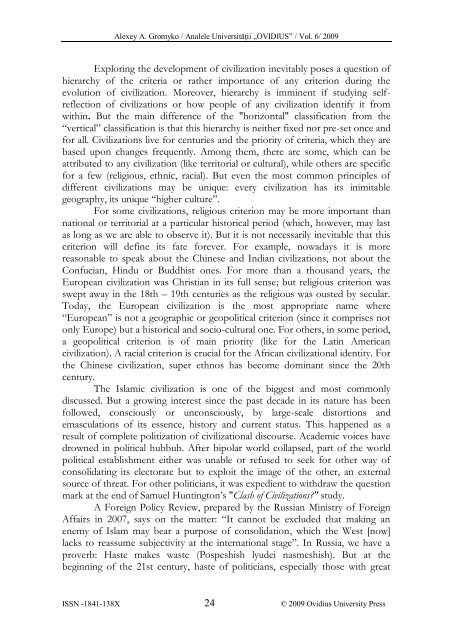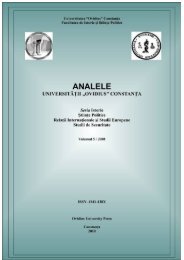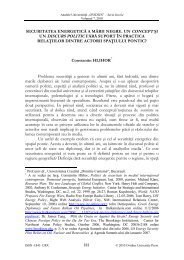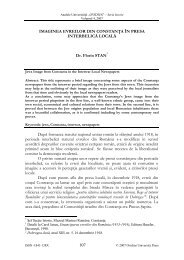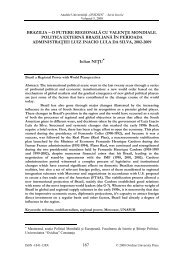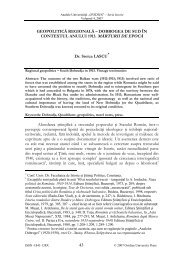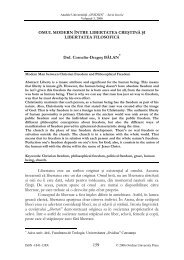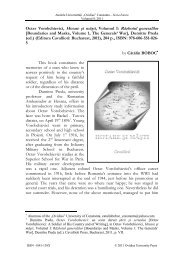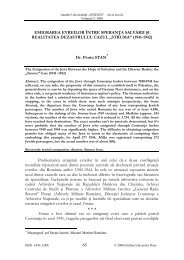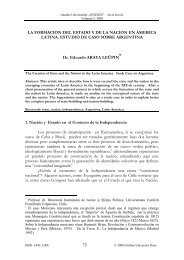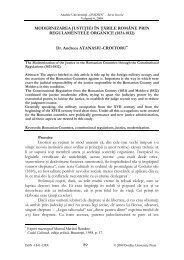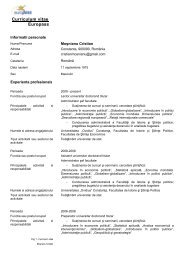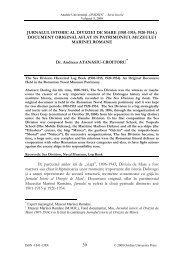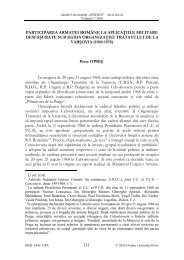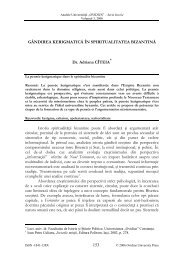analele universitÄÅ£ii âovidiusâ constanÅ£a - AUOCSI
analele universitÄÅ£ii âovidiusâ constanÅ£a - AUOCSI
analele universitÄÅ£ii âovidiusâ constanÅ£a - AUOCSI
You also want an ePaper? Increase the reach of your titles
YUMPU automatically turns print PDFs into web optimized ePapers that Google loves.
Alexey A. Gromyko / Analele Universităţii „OVIDIUS” / Vol. 6/ 2009<br />
Exploring the development of civilization inevitably poses a question of<br />
hierarchy of the criteria or rather importance of any criterion during the<br />
evolution of civilization. Moreover, hierarchy is imminent if studying selfreflection<br />
of civilizations or how people of any civilization identify it from<br />
within. But the main difference of the "horizontal" classification from the<br />
“vertical” classification is that this hierarchy is neither fixed nor pre-set once and<br />
for all. Civilizations live for centuries and the priority of criteria, which they are<br />
based upon changes frequently. Among them, there are some, which can be<br />
attributed to any civilization (like territorial or cultural), while others are specific<br />
for a few (religious, ethnic, racial). But even the most common principles of<br />
different civilizations may be unique: every civilization has its inimitable<br />
geography, its unique “higher culture”.<br />
For some civilizations, religious criterion may be more important than<br />
national or territorial at a particular historical period (which, however, may last<br />
as long as we are able to observe it). But it is not necessarily inevitable that this<br />
criterion will define its fate forever. For example, nowadays it is more<br />
reasonable to speak about the Chinese and Indian civilizations, not about the<br />
Confucian, Hindu or Buddhist ones. For more than a thousand years, the<br />
European civilization was Christian in its full sense; but religious criterion was<br />
swept away in the 18th – 19th centuries as the religious was ousted by secular.<br />
Today, the European civilization is the most appropriate name where<br />
“European” is not a geographic or geopolitical criterion (since it comprises not<br />
only Europe) but a historical and socio-cultural one. For others, in some period,<br />
a geopolitical criterion is of main priority (like for the Latin American<br />
civilization). A racial criterion is crucial for the African civilizational identity. For<br />
the Chinese civilization, super ethnos has become dominant since the 20th<br />
century.<br />
The Islamic civilization is one of the biggest and most commonly<br />
discussed. But a growing interest since the past decade in its nature has been<br />
followed, consciously or unconsciously, by large-scale distortions and<br />
emasculations of its essence, history and current status. This happened as a<br />
result of complete politization of civilizational discourse. Academic voices have<br />
drowned in political hubbub. After bipolar world collapsed, part of the world<br />
political establishment either was unable or refused to seek for other way of<br />
consolidating its electorate but to exploit the image of the other, an external<br />
source of threat. For other politicians, it was expedient to withdraw the question<br />
mark at the end of Samuel Huntington’s "Clash of Civilizations" study.<br />
A Foreign Policy Review, prepared by the Russian Ministry of Foreign<br />
Affairs in 2007, says on the matter: “It cannot be excluded that making an<br />
enemy of Islam may bear a purpose of consolidation, which the West [now]<br />
lacks to reassume subjectivity at the international stage”. In Russia, we have a<br />
proverb: Haste makes waste (Pospeshish lyudei nasmeshish). But at the<br />
beginning of the 21st century, haste of politicians, especially those with great<br />
ISSN -1841-138X 24 © 2009 Ovidius University Press


